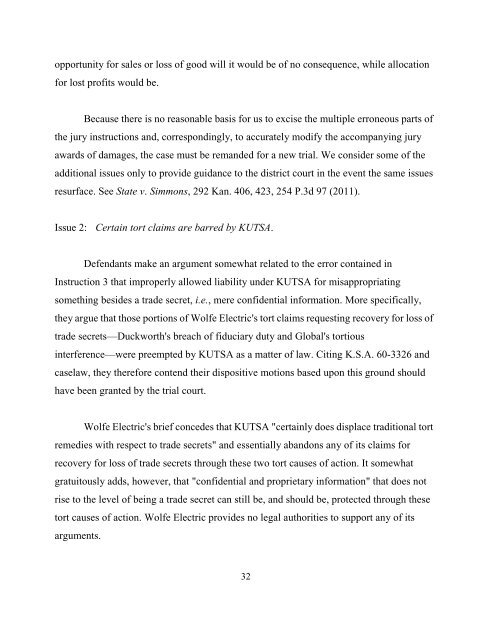Kansas Supreme Court - 99536 â Wolfe Electric, Inc. v. Duckworth
Kansas Supreme Court - 99536 â Wolfe Electric, Inc. v. Duckworth
Kansas Supreme Court - 99536 â Wolfe Electric, Inc. v. Duckworth
You also want an ePaper? Increase the reach of your titles
YUMPU automatically turns print PDFs into web optimized ePapers that Google loves.
opportunity for sales or loss of good will it would be of no consequence, while allocation<br />
for lost profits would be.<br />
Because there is no reasonable basis for us to excise the multiple erroneous parts of<br />
the jury instructions and, correspondingly, to accurately modify the accompanying jury<br />
awards of damages, the case must be remanded for a new trial. We consider some of the<br />
additional issues only to provide guidance to the district court in the event the same issues<br />
resurface. See State v. Simmons, 292 Kan. 406, 423, 254 P.3d 97 (2011).<br />
Issue 2: Certain tort claims are barred by KUTSA.<br />
Defendants make an argument somewhat related to the error contained in<br />
Instruction 3 that improperly allowed liability under KUTSA for misappropriating<br />
something besides a trade secret, i.e., mere confidential information. More specifically,<br />
they argue that those portions of <strong>Wolfe</strong> <strong>Electric</strong>'s tort claims requesting recovery for loss of<br />
trade secrets—<strong>Duckworth</strong>'s breach of fiduciary duty and Global's tortious<br />
interference—were preempted by KUTSA as a matter of law. Citing K.S.A. 60-3326 and<br />
caselaw, they therefore contend their dispositive motions based upon this ground should<br />
have been granted by the trial court.<br />
<strong>Wolfe</strong> <strong>Electric</strong>'s brief concedes that KUTSA "certainly does displace traditional tort<br />
remedies with respect to trade secrets" and essentially abandons any of its claims for<br />
recovery for loss of trade secrets through these two tort causes of action. It somewhat<br />
gratuitously adds, however, that "confidential and proprietary information" that does not<br />
rise to the level of being a trade secret can still be, and should be, protected through these<br />
tort causes of action. <strong>Wolfe</strong> <strong>Electric</strong> provides no legal authorities to support any of its<br />
arguments.<br />
32
















